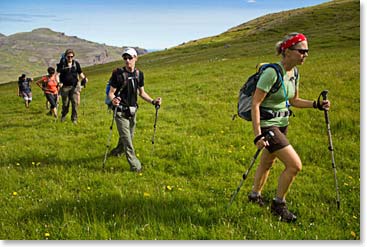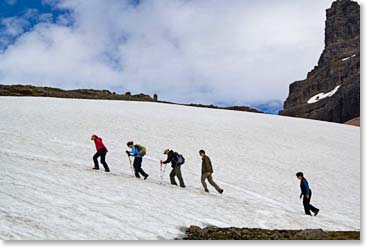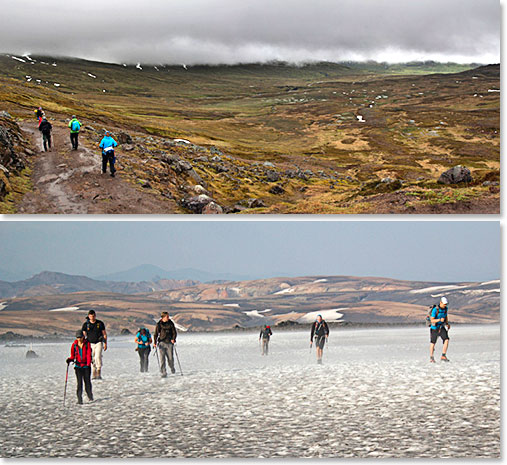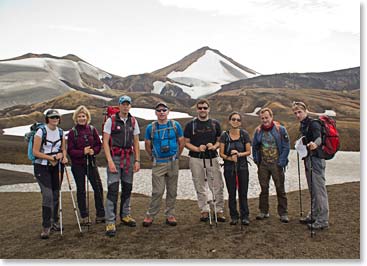
Trekking in Iceland with Berg Adventures – Trip FAQ
Here is where you will find answers to some of your questions about this expedition. If you do not find what you need here, please contact us at info@bergadventures.com.
Choose the specific question to link to your answer
- How do I get to Iceland?
- When is the best time to visit Iceland?
- What is the size and population of Iceland?
- What language is spoken in Iceland?
- What is the weather like in Iceland?
- Which time zone is Iceland in?
- What should I wear during my trip to Iceland?
- What about the quality of local drinking water?
- What type of electrical outlets will we find?
- How is the communication for Phone and Internet?
- What is the local currency and which cards are commonly accepted?
- 1. How do I get to Iceland?

- Iceland is located in the North Atlantic Ocean just below the Arctic Circle midway between Europe and North America. The international airport in Keflavík is about 45 minutes from Reykjavík and is serviced by Iceland air, SAS and a number of international carriers.
- 2. When is the best time to visit Iceland?

- In Iceland, each season has its own charm. The summer remains the most popular season for enjoying the outdoors and different activities. Mid-June to mid-September offers the biggest selection of organized tours. The fall and winter are a time of lighter traffic, beautiful colors and the amazing northern lights as well as various winter activities. Winter is also a time for festivals; spending Christmas and New Years in Iceland is a unique experience!
- 3. What is the size and population of Iceland?

- Iceland is Europe’s second largest island at around 103 000 km2. Its population is around 320 000 making it one of the sparsely populated countries in Europe. The majority of the population lives in the capital area of Reykjavik and most of the other towns are located around the coast.
- 4. What language is spoken in Iceland?

- The language in Iceland is Icelandic. It is a Nordic language of Germanic origin and related to Scandinavian languages. It was the language of the Vikings and has not changed much over the centuries. English is spoken by almost everyone and Icelanders are known to have very clear, easy to understand accents when they speak English.
- 5. What is the weather like in Iceland?

- The climate of Iceland's coast is sub polar oceanic. The warm North Atlantic Current ensures generally higher annual temperatures than in most places of similar latitude in the world. Despite its proximity to the Arctic, the island's coasts remain ice-free through the winter.
- The climate varies between different parts of the island. The south coast is warmer, wetter and windier than the north. The central highlands are the coldest part of the country and the north being the most arid.
- The summers can be quite cool, with an average temperature around 10–13 °C (50–55 °F) and with seasonal highs reaching up to around 25ºC/77ºF.
- 6. Which time zone is Iceland in?

- Iceland is on Greenwich Mean Time (GMT) all year and does not have daylight saving time. In the summer, from around mid-May to mid-August the sun only sets for a few hours so there is daylight for 24 hours. However in the darkest winter months there are only about 4-5 hours of daylight.
- 7. What should I wear during my trip to Iceland?

- No matter which season you choose for your visit, it is always necessary to bring a warm sweater, a hat and gloves, a rain-and-wind proof shell as well as a pair of good shoes, as you never know how the weather and wind may turn. Another practical item is your bathing suit which will be necessary for the pools and geothermal bathing.
- 8. What about the quality of local drinking water?

- Iceland has an abundance of pure water and the water from the tap is both fresh and clean. Bottled, Icelandic water is from the same source as the equally pure water coming from the tap. Note that in some areas the water from the hot water tap has a sulfur taste which takes some getting used to.
- 9. What type of electrical outlets will we find?

- Voltage in Iceland is 220-240. Check your appliances and battery chargers and make sure they are dual voltage. Please note that prongs can be different from you standards. All major hotels can provide you with adapter prongs to use on your electronics. Read our article Guide to Electrical Outlets around the World to learn more.
- 10. How is the communication for Phone and Internet?

- Iceland is very well connected and free Wi-Fi service is easily found in Reykjavík and in many accommodations and cafes around the country. Mobile phone coverage is good in all urban areas and along main roads. You should always check with your service provider regarding coverage and costs abroad so you don’t come home to unexpected charges. Most companies have international plans available.
- 11. What is the local currency and which cards are commonly accepted?

- The currency in Iceland is called krona (crown), or ISK and all banks change foreign currencies. The use of credit and debit cards is also common almost everywhere and they can be used for even the lowest amounts. Cash can also be obtained with credit cards and banks and at ATM’s.

The summers in Iceland are lush and enchantingly green

Trekking through the snow

Trekking through the ever changing Icelandic landscapes

Climbers in their gear, ready to begin another day full of adventure!

